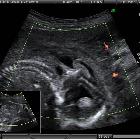chromosomal anomalies
There are a large number of recognized chromosomal anomalies (many with eponyms). When there is a change in the absolute number of chromosomes these are subgrouped as aneuploidic anomalies.
They can cause a variable degree of disability with outcomes ranging from no effect (in some balanced translocations) to others being lethal or resulting in a markedly shortened life expectancy (unless mosaicism present).
This (non-exhaustive) list includes:
- 1p36 deletion syndrome
- 11q deletion syndrome - Jacobsen syndrome
- 12p tetrasomy - Pallister-Killian syndrome
- 4p deletion syndrome - Wolf-Hirschhorn syndrome
- 17p deletion syndrome - Miller Dieker syndrome
- 18q deletion syndrome
- Klinefelter syndrome
- triploidy
- trisomy 2 mosaic
- trisomy 3 mosaic
- trisomy 4 mosaic
- trisomy 5 mosaic
- trisomy 6 mosaic
- trisomy 7 mosaic
- trisomy 8 / trisomy 8 mosaic - Warkany syndrome
- trisomy 9 / trisomy 9 mosaic
- trisomy 10 / trisomy 10 mosaic
- trisomy 13 - Patau syndrome
- trisomy 18 - Edward syndrome
- trisomy 21 - Down syndrome
- trisomy 22 / trisomy 22 mosaic
- monosomy X - Turner syndrome
Siehe auch:
- Pätau-Syndrom
- Down-Syndrom
- Meckel-Syndrom
- Turner-Syndrom
- Trisomie 18
- Trisomie 22
- Triploidie
- Pena-Shokeir-Syndrom
- aneuploidy
- Jacobsen syndrome
- De-Grouchy-Syndrom Typ 2
- Klinefelter-Syndrom
- Wolf-Hirschhorn-Syndrom
- Miller-Dieker Syndrom
- Pallister-Killian-Syndrom
- 4p deletion syndrome
- Trisomie 9
und weiter:

 Assoziationen und Differentialdiagnosen zu chromosomale Anomalien:
Assoziationen und Differentialdiagnosen zu chromosomale Anomalien:






